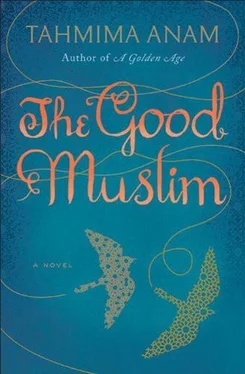She follows the outline of the building, turns around a bend and finds herself on a path leading through the bush. She sees the school building, a rectangular room with a tin roof. And, from within, a hum, many-voiced, like the sound of bees.
Just as the man said, there is a small square shack, the size of a chicken coop. There is no roof but the walls are high. She bangs on the door before attempting the lock. She is afraid to cry out, afraid she will be heard, afraid of what she will hear. The door replies. It is not a voice, only a soft rap, rap rap, not even from knuckles, more like the press of a hand. The lock is attached to a bolt on the door.
She uses the key.
The door swings open and he is inside, squatting over a pit dug into the ground. She holds out her arms and he leaps into them, and she thinks he is calling her name, Maya Maya Maya. Her heart sings along to it, but then the words come into focus, and she remembers she is still in her disguise, and that he has mistaken her for his mother. Ma, ma, ma.
She packs him into the boat. He clings to her. The Arabic alphabet , he says. Alif-ba-ta-sa. I know it . They make it to Gaibandha. On the boat, in darkness again, Maya pleads with Zaid to eat something. He refuses, gazing through the thin bamboo netting that arches over the boat, his eyes searching for the night sky. I know the Arabic alphabet, he repeats. Where is my mother? She isn’t here, Maya tells him, you know that. Bismillah ir-Rahman ir-Raheem , he begins, reciting the words he has been taught. Nauzubillah hira-shahitan-ir-Raheem . A small lizard has made its way on board, and scuttles back and forth among the curved roof slats. He settles for this, chasing it with his finger.
His grandmother is waiting at home, Maya tells him, she will be so happy to see him. His father too. At the mention of his father he says, I don’t want to go home. I know the Arabic alphabet. Alifbatasa. BismillahirRahmanirRaheem . There is a cut on his cheek. A bruise on the crease of his elbow.
She feels a sharp twist of guilt now, for the chappals she never bought him, for allowing him to be caught stealing, for not treating him more like he was hers, like something of her own. She expects to be angry too at his father, expects the rage to have thundered into her by now, but at this very moment she can only summon reproof for herself.
Khoka cannot take his eyes off the boy. He stares and stares, chasing Zaid’s hand as it picks up the lizard, pulls off its tail and flings it into the water.
As they approach the shore Zaid’s recitation gets louder and louder. I like oranges , he says. Bring me an orange. Bring me a bicycle. He starts reciting the call to prayer. AshahadullahMuhammadur RasoolAllah . He stands up and leans his weight this way and that. The boat tilts. The shore is crowded with boatmen and fishermen and people like them, people between one place and another. Closer now, and he begins to wail, banging his fists against Maya as she throws her arms around him. ‘You want to stay on the boat, Zaid, is that what you want? You want to stay the night here? All right, all right.’
They turn around again, moving away from the ferry dock, and the boatman moors them against the river bank.
Khoka and the boatman make their way to the shore, leaving her alone with Zaid. It’s getting chilly and she unzips her burkha and envelops the boy within it. He turns his back to her and she curls herself around him, her hands gently stroking his hair. His breathing slows.
‘We’ll go home,’ she says. ‘Tomorrow we’ll be home.’
‘I don’t want to.’
‘Don’t worry, it won’t be like before.’
‘I tried to run away.’
‘I know, Rokeya told me.’
‘But Abboo sent me back.’
‘He won’t, once you tell him everything. He’ll never send you there again. Sleep now. Tomorrow we’ll be home.’
She is tired now, so tired. She thinks he is saying something to her, but she isn’t sure. I want a bicycle. I already told him . ‘Don’t worry,’ she mumbles. ‘I’ll talk to him. Nothing bad will happen to you now.’
Alifbatasa .
It is only a few moments of sleep, but she will remember them as the sweetest she has ever known, because the boy breathes beside her, the years unmarked ahead of him.
She is dreaming when she hears it, the small splash, little more than a hiccup in the water. But she knows, she knows it is him. She plunges in, the burkha billowing around her, the current pulling her away from the boat in an instant. She calls out to him, she opens her eyes underwater, tries to gaze through the darkness and the liquid silt of the Jamuna, falls deeper and deeper into the night of it, and, then, a pair of strong hands on her shoulders. She opens her eyes. Khoka. She struggles, pushing against him, but they are already on the boat now. How strong he is. How rough the current, how hungry.
She wakes to a slap on the head, and hands that grab her, pulling her arms apart. She discovers something about the police at that moment: that they divide the body so that one side cannot collude with the other. They raise her up, off her feet, and she screams WHEREISZAID, before her head hits the floor of the truck and all is black.
Cold and not a Speck of Light
Cold and not a speck of light. In the dark, she fumbles for her face. Nose, broken. Lips like burst fruit. She presses, examines, the pain spreading to her cheeks, her temples.
She tugs at the burkha. It’s a cruel joke, the way she has clung to this garment. The other prisoners are nearby but she can’t hear them. She was with them at first, crammed into a room where the women slept in shifts. But she started screaming and wouldn’t stop. The women surrounded her, making noises of comfort. Still she screamed.
ZAIDWHEREISZAID.
Finally a policeman came into the cell, threw her to the ground and pounded her into blackness. She opened her eyes to this: a coffin of a room, no longer anyone to shout at.
The slide of metal. A plate, a glass of water.
She drinks the water but when they come to collect the tray she throws it at them. Let her body taste hunger. Better if her head is light, her limbs heavy. Better not to remember the deep underwater sound.
They send her a woman. Soft voice. You haven’t eaten in three days.
Where is Zaid?
Are you on hunger strike? Tell us why you’re here.
Of course they know why she is there. Why else would they have brought her in? A pre-emptive strike by that slant-toothed Huzoor.
Where is Zaid?
How very stupid she has been. Wanted so badly for her brother to return to her that she had ignored her own oath. First. Do. No. Harm.
A small hand collides with her cheek. The lip opens up again. ‘Eat, bitch. I will not have your death on my hands.’
Days later, maybe a week, she cannot tell, she is packed into a van. Hands tied together with rope and the smell of the country in her nostrils, grass and paddy and drying cow dung all the way to the edge of town. A man writes her name into a ledger.
In Rajshahi, she was surrounded by children. She lost count of how many she had helped to bring into the world, but she kept a tally of the ones she buried, dead because of cholera, or snakebite, or the sudden rise of a nearby river, or because the tin of milk was too dear when the mother dried up, or for no reason at all. For no reason at all she had seen one hundred and thirty-seven to their graves.
She had loved every one of them, even if she had known them only long enough to pronounce their deaths, putting her ear to their little chests and telling their mothers it was over, there was nothing more to be done. But none had pounced on her heart with such ease, not a living or a dead one. A tongue-twisting, card-cheating, disappearing phantom of a child.
Читать дальше












